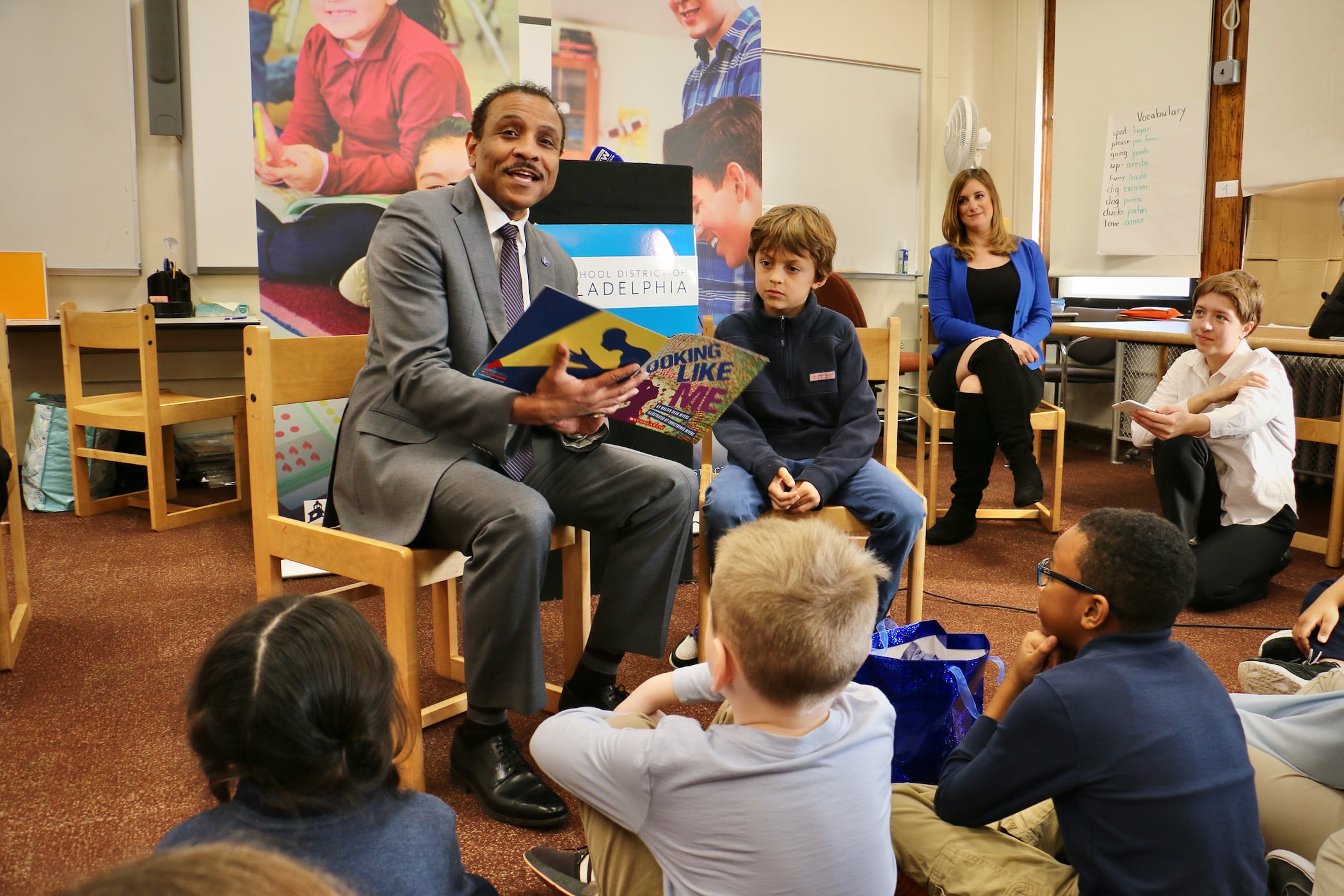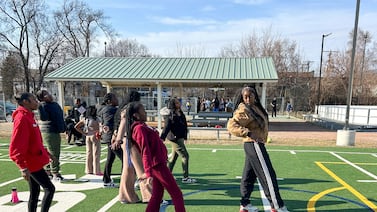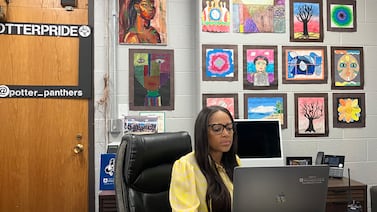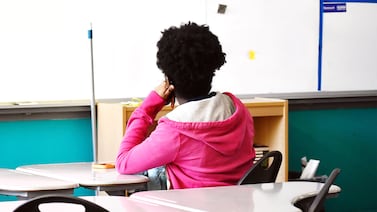This story originally appeared on WHYY.
Third grade students at Fanny Coppin Elementary gathered Wednesday to read the first of 20 books they’ll read in the next 20 weeks.
The School District of Philadelphia will give a prize to every third grader who completes the challenge, though district officials haven’t decided on a specific prize yet.
Officials will track participation at the school and district levels. All third graders who complete the challenge will also be entered into a special raffle, said La Tanya Miller, the district’s executive director for academic supports.
“Literacy is the foundation of all learning, which is why proficient reading by the end of third grade is so critical,” Superintendent Tony Watlington said.
Third grade is the final year when children should be learning to read as opposed to reading to learn, according to reading experts. Students who aren’t proficient readers when they begin fourth grade are far more likely to fall behind their peers, not just in reading, but in all subjects.
A long-term study from the Annie E. Casey Foundation published in 2012 found students who weren’t proficient in reading by the end of third grade were four times more likely to drop out of high school.
Watlington pointed to the district’s 70% four-year graduation rate as one of several reasons why he plans to invest more district resources in early literacy.
The 20-week challenge is meant to complement classroom instruction by helping students grow their love of learning, he said, while practicing literacy skills at home like vocabulary and reading comprehension.
All third grade students will receive 10 books selected through the district’s partnership with Scholastic. The district will spend just over $550,000 on the program, officials said.
The books, which district officials described as “culturally relevant,” are meant to help students reach the 20-book reading goal and build their at-home library, Watlington said. The books are written at a variety of reading levels, district spokesperson Marissa Orbanek said, in recognition that different students need different materials.
One of the books is “Looking Like Me,” written by acclaimed children’s book author Walter Dean Myers and illustrated by his son Christopher Myers.
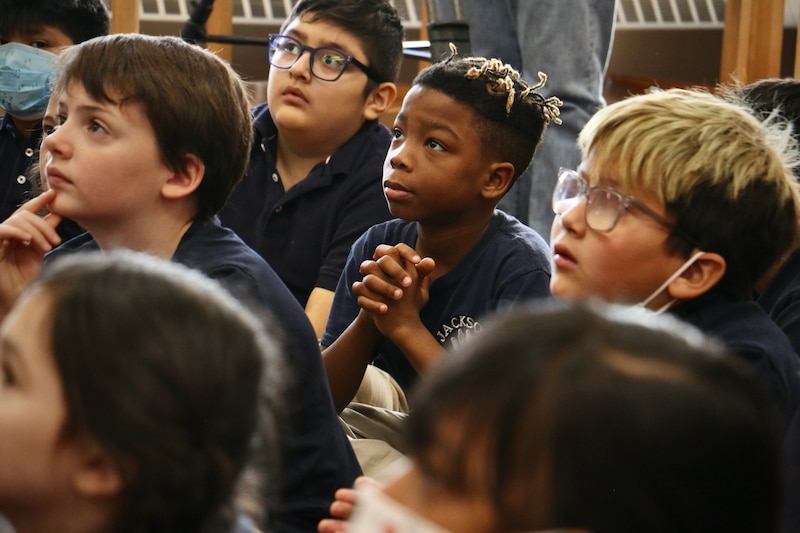
Watlington and Dominic, a third grade student at Coppin, read the book aloud to Dominic’s classmates Wednesday.
“I looked in the mirror and what did I see? A real handsome dude looking just like me,” Watlington read.
“He put out his fist. I gave it a bam. He said Jeremy. I said that’s who I am.”
Watlington passed the book to Dominic who picked up the story. The two alternated pages, with the third grader reading confidently.
“I’m a writer spinning dramas that dance across the stage, a poet weaving mysteries that live upon the page,” Dominic read.
As they progressed through the book, Watlington encouraged the other children to chime in.
“She put out her fist — I bet you can finish the next line,” he said.
To which the kids gladly shouted: “I gave it a bam.”
While Dominic read the book with ease, many of the district’s third graders likely would have struggled if placed in his seat.
Just 28.2% of Philadelphia third graders scored proficient or higher in reading on the Pennsylvania System of School Assessment (PSSA) during the 2021-22 school year, a slight decrease from the pre-pandemic rate which was 32.5% in 2019.
The district’s third grade reading performance as measured on the PSSA has been flat for over a decade, Watlington said. As a whole, third through eighth grade reading scores on the test increased by four percentage points during the same time period.
The scores are below the goals Philly schools have set for themselves.
During the 2020-21 school year, the Philadelphia school board said it wanted 62% of third-graders to be proficient by August 2026. To be on track, 44.3% of students would need to be reading on grade level this year.
Watlington said Wednesday that the district is looking at research on reading instruction and talking to successful teachers to help build a better district-wide approach.
“We know there’s a lot of research now about the science of reading. We’ll be talking about that more over time here in the school district,” he said.
Several states, including Mississippi, have seen dramatic gains in literacy after turning to the science of reading, which stresses the importance of foundational skills such as phonics.
For decades, many schools relied on an approach to reading known as whole language, in which students are taught to recognize words by sight rather than sound them out. While the debate over the best way to teach reading is ongoing, many have spoken out against the whole language approach.
Watlington pointed to Mississippi on Wednesday and the decision of other districts to invest in the science of reading.
“The New York City schools are going to invest,” he said, adding that the School District of Philadelphia will invest, too.
The district shifted its reading curriculum in 2019 to focus more on the science of reading, including phonics.
Brooks said teachers use a “tiered approach” in the classroom to make sure children who aren’t reading on grade level don’t fall further behind.
As a whole class, lessons typically use material that is age-appropriate, so all students are exposed to the content. Teachers or reading interventionists then pull students who are behind aside to work on specific skills to help them increase their reading level.
In addition to literacy coaches in schools, Orbanek said the district also offers an online tutoring program as part of its approach to remediating learning loss following the pandemic.
Watlington said no matter what reading level a student is at it’s important to expose them to material that challenges them.
“What we can’t do is say ‘Kids can only read at this level, so we’ll never expose them to grade-level appropriate content,’” he said. “I say it all the time, we will never remediate our way to excellence.”

